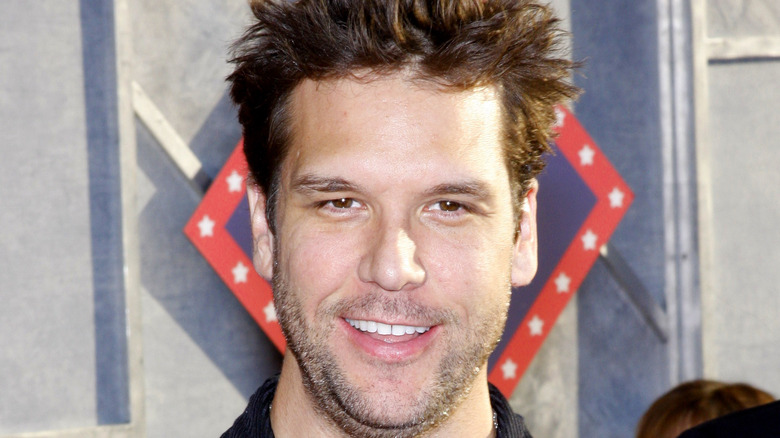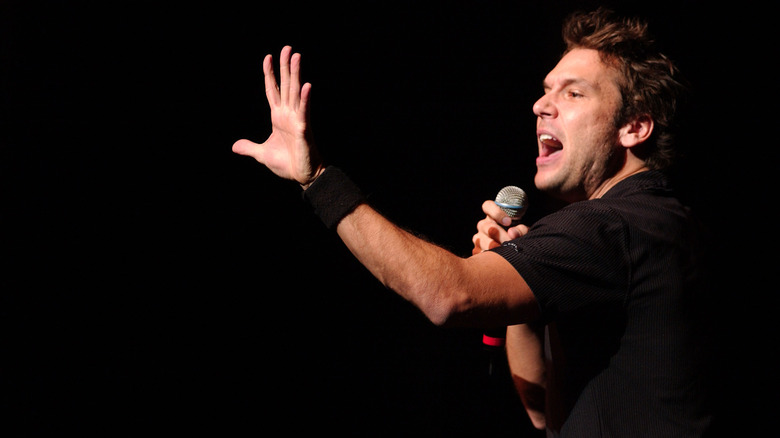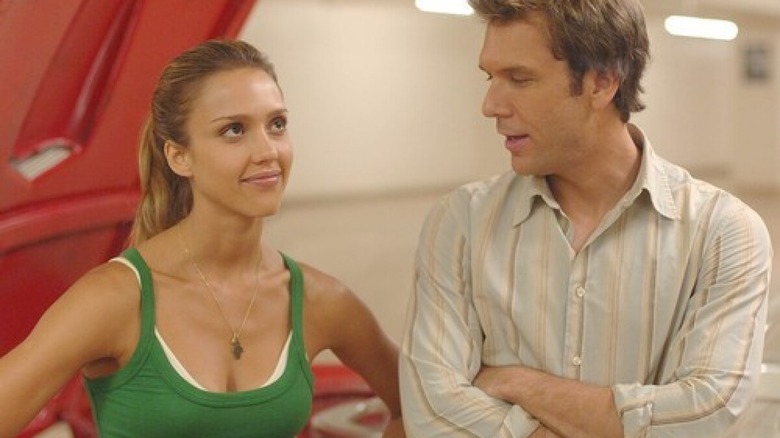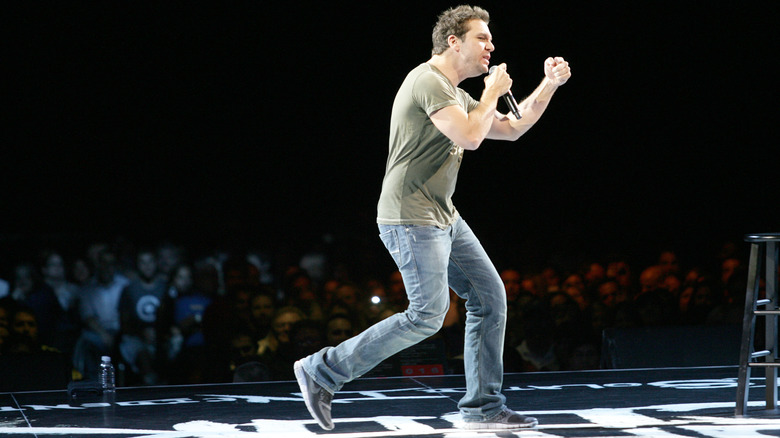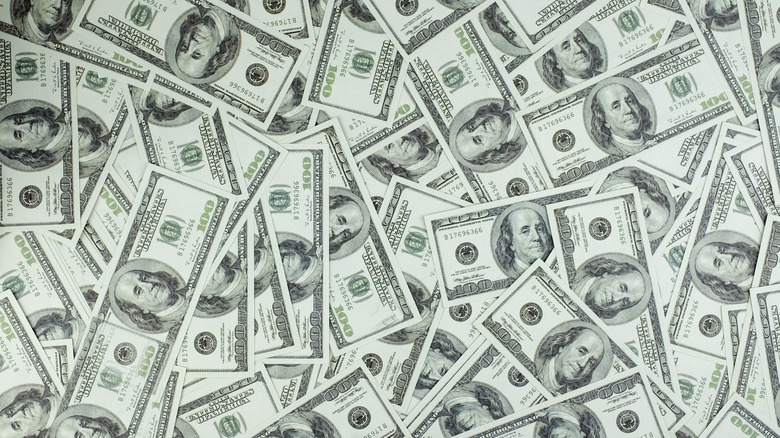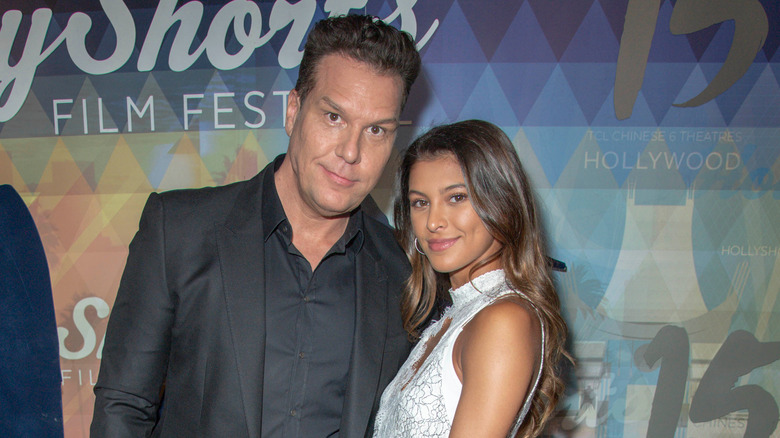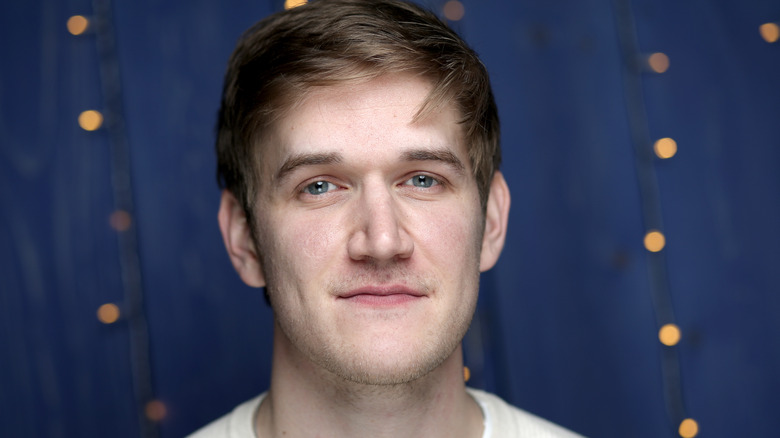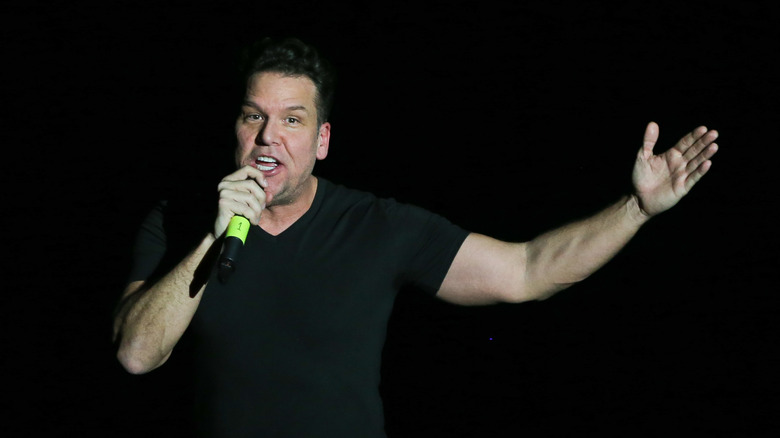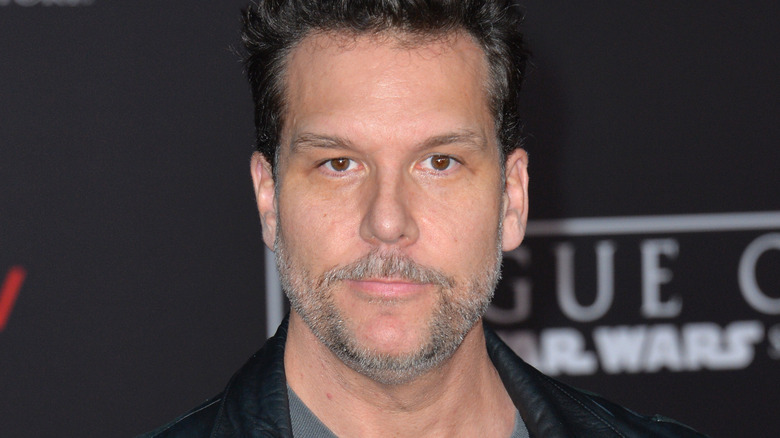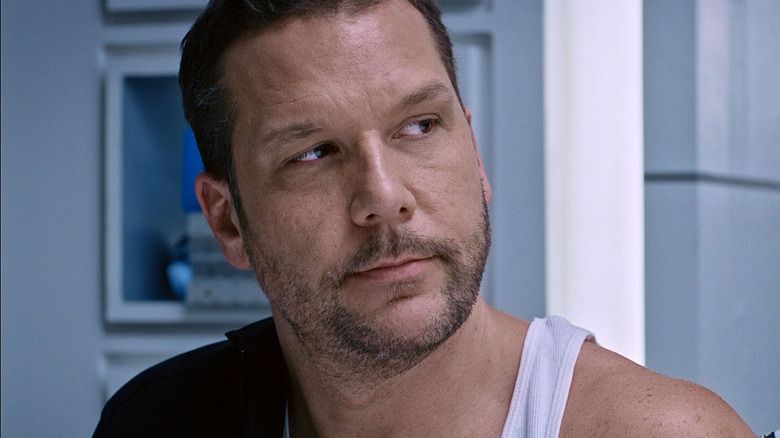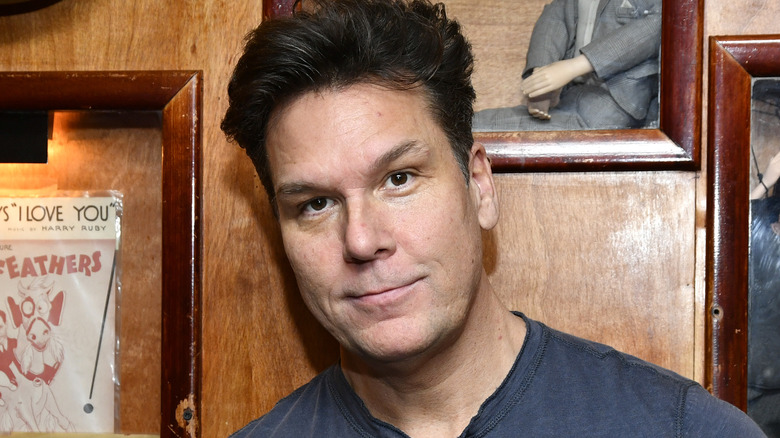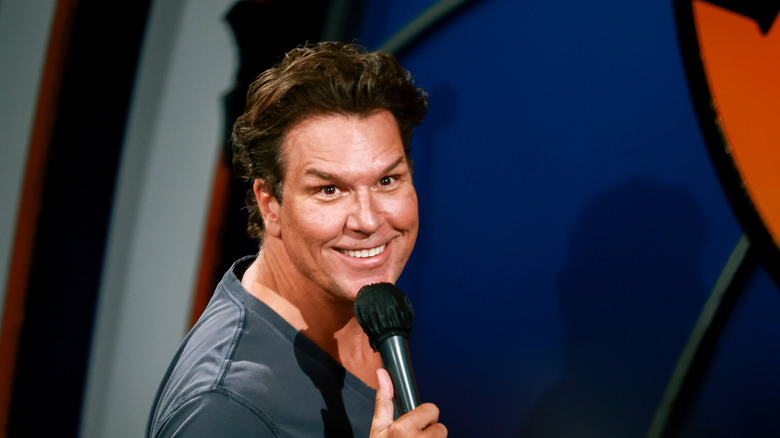Whatever Happened To Dane Cook?
If you follow the stand-up comedy scene, maybe you already know the answer to the question posed in the headline above.
If that's not the case, perhaps you only remember Dane Cook as an energetic comedian whose abilities to scream, flail his arms, and run across a stage charmed the pants off of America throughout the 2000s. During that period, Cook appeared destined for film and television superstardom, yet he all but vanished from mass media right around 2010 or thereabouts.
Millennials might wonder why the zany jokester isn't a household name anymore, but if you're Gen Z or below, you probably have no idea who Dane Cook is, 'cause when he was super famous, you were much too young to listen to his often bawdy, profanity-laced routines.
Truth be told, Cook's stumble from cultural ubiquity is a well-worn topic. There are already plenty of articles that begin by posing some variation of the question, "What's the deal with formerly famous guy Dane Cook?" Looper has been wondering about this since at least 2017. Many articles over the years have claimed that he's on the verge of making a comeback, even as recently as 2019, but it hasn't panned out — at least not yet.
Whether they like Dane Cook, hate Dane Cook, or liked Cook during the '00s and now pretend they hated him all along, folks are still wondering exactly how he fizzled out of the entertainment scene. Let's retrace some steps and figure out where Cook went wrong.
The Dane Cook bubble was doomed to pop
It's one thing for an actor to score a couple of choice movie roles and drift back into obscurity, or for a musician to record a hit single and never repeat the achievement. Those sorts of things happen all the time. But at its height, Dane Cook's popularity was totally unprecedented — or at least it felt that way at the time.
Cook sold out Madison Square Garden in 2006. The list of comics who have done the same is very short, and includes George Carlin and Eddie Murphy. Billboard notes that before 2005's "Retaliation" climbed to the No. 4 position on their chart (not the comedy chart; the general chart that includes all the music, too), there hadn't been a comedian in the top 5 since Steve Martin in 1978.
Before the end of the 2000s, Cook was overhyped and overexposed; the other shoe was bound to drop, and the retributive anti-Cook sentiment was merciless. People went from laughing at the Whopper Lair on their Discmans or classic iPods to dismissing Cook as an annoying, fratty gasbag. Liking Dane Cook became as uncool as liking Nickelback. Needless to say, he hasn't been invited back to MSG recently.
To his credit, Cook sounds like he has a pragmatic attitude about his downfall.
"Oh, I knew [the backlash was coming]," he says on "You Up? with Nikki Glaser." "I think I helped. I'm like, 'I'm ready to devolve and then evolve again.'" He continues, "We're in it for the long haul ... fans are going to come and go."
His transition to acting left much to be desired
As far as stand-up comedy goes, Dane Cook's popularity was virtually unmatched at its height. Transitioning to TV or movies seemed like the next natural step — one that many successful comedians have taken, from Richard Pryor to Jim Carrey. But he never amounted to much as an actor.
It wasn't for lack of trying. From 1999's maligned "Simon Sez" (co-starring Dennis Rodman, of all people), to a 2005 pre-"Deadpool" Ryan Reynolds vehicle, to misguided attempts at positioning Cook as a leading man like 2006's "Employee of the Month" and 2007's "Good Luck Chuck," to the curiously conceived murder drama "Mr. Brooks," to an NBC sitcom titled "Next Caller" that never even made it to broadcast, Dane Cook tried it all. Unfortunately, he never really clicked anywhere beyond the stage. This was true even before he made it big; even the way-ahead-of-its-time 1999 classic "Mystery Men" — in which Cook has a brief but highly memorable cameo as up-and-coming superhero "The Waffler" — was technically a significant financial failure upon its release.
Granted, some of the all-time great standup comedians also enjoy tremendous success in other, more mainstream media. But we can hardly expect everyone to be Robin Williams, can we? Cook can be an explosive and totally unique presence onstage, but in front of a camera, he's just another schlub. There are at least one thousand Average Joes in Hollywood who can do that job as well as he can. Cook has also claimed that his acting career dead-ended because if he's not "writing it and creating it from the ground up [himself], then [he finds] it's harder to step into comedic roles, because you don't want to be false for your fans." Sure, Jan.
Maybe he's not the original author of his jokes?
Then there was a whiff of scandal. At least three skits audible on Dane Cook's monster smash album "Retaliation" sound pretty darn similar to bits Louis C.K. performed years prior. Joke stealing is a major no-no in stand-up comedy, but Cook denied any deliberate plagiarism took place. According to a 2011 Entertainment Weekly article, Louis C.K. said he eventually got tired of every single interviewer he spoke with asking him about his allegations against Cook, so Louis C.K. wrote Cook into a Season 2 episode of FX's "Louis." This way, fictionalized versions of the two comics could squash their beef once and for all on primetime cable TV.
Louis C.K. abruptly went from a major Hollywood star to a persona non grata himself in 2017 due to revelations about his personal behavior. In 2019, Cook — who no longer had to worry about consequences for bashing Louis C.K. in the press — suggested that his disgraced ex-colleague benefited from falsely accusing him of intellectual property theft.
"I think he knew that he could be more popular talking about why I shouldn't be popular," Cook tells The Hollywood Reporter. "It helped him, it really did. It was like he was on a press tour because of it."
The tarnishing of Louis C.K.'s image wasn't enough to save Cook's, however. Whatever the truth is, many people still associate Cook with thievery. Plus, Cook didn't have to plagiarize to get in trouble. He had to apologize for a too-soon, off-color joke about the tragic Aurora shooting that got him in hot water back in 2012.
His family members were involved in a nasty embezzlement situation
As a rich and famous individual with a punchable onstage persona, Dane Cook's not the type of figure who easily elicits sympathy. But it's hard to look at what unfolded in his financial and family life right around December 2008 and not feel pretty bad for him.
It's never happened to us, but we assume when an immediate family member steals millions of dollars from you, that does a major number on your emotional and mental well-being.
According to a CNN report, Cook's half-brother and former business manager, Darryl McCauley, confessed to embezzling $12 million from his famous sibling; his wife Erika McCauley also fessed up to exploiting their access to Cook's money. Mr. McCauley was sentenced to six years in prison, Mrs. McCauley was sentenced to three, and both received lengthy durations of probation.
If Cook wasn't as focused on his career as it seemed like he could've been from roughly 2008 to 2011, we can't blame him; he clearly had other problems on his mind. As of 2018, Dane Cook had yet to develop a sense of humor about that time his brother ripped him off.
It is our duty to report that Cook is in a relationship with a woman about half his age
Drastic age differences in romantic relationships are controversial, raising eyebrows and inviting moral judgment. It's not the norm, but enough people in their 20s (and sometimes even younger) date people in their 40s and up that it's not exactly unheard of, either — particularly in Hollywood.
On the other hand, it is definitely weird for Cook to discuss his girlfriend in the press and on social media as much as Dane Cook seems to talk about his beau, Kelsi Taylor, who is 26 years younger than him.
There's a gray area between Cook's apparent desire to publicize his relationship and the extent to which he may as well be open about it since news outlets are going to cover it anyway. Let's face it — Hugh Hefner is dead, we live in a post-#MeToo universe, and society (mostly) no longer lionizes aging millionaires sleeping with women easily young enough to be their daughters. While there's no evidence or indication of wrongdoing here, from a purely PR-related standpoint, Cook hypothetically would've been smart to spin his relationship in the media before an intrepid, opportunistic gossip columnist could do it for him.
Or maybe he just loves talking about his girlfriend and has no other ulterior motive. Either way, the attention around his relationship hasn't really reignited his career (nor have rumors that he's gotten cosmetic work done). Let's just hope they're both happy.
Today's comedy zeitgeist is a million years from the 2000s
The most talked-about comedy special of 2021 was probably Bo Burnham's "Inside." The 30-year-old comedian recorded his fifth hour of material entirely during the 2020 pandemic and managed to mine the isolation and helplessness of lockdown for laughs, which we didn't think was possible until we watched the special. "Inside" captures the moment by zeroing in on the emotional and technological day-to-day of lockdown life, rather than the newsy side of 2020 that might be more explosive, while also abstracted from most of our individual realities. It's a refreshingly honest and intimate, yet somehow hilarious, look at the dark subject matter of anxiety and depression.
It's also millions of miles from Dane Cook's comedy style. If the intense, thought-provoking content of "Inside" is the kind of humor that people go for these days — and we're pretty sure we do — then contemporary culture as a whole probably isn't stoked to revisit juvenile bits that high schoolers thought were hilarious in 2005 about bad breath and how public bathroom floors are always wet.
It's too late for Dane Cook to get canceled
Even if Dane Cook were to adopt a socially aware, self-effacing, thoughtful persona to get with the times, the public might not accept him in that mold. It's quite a departure from his familiar identity as a yelling guy whose arms never stop bending and waving, like a wacky inflatable tube man come to life.
Cook could maybe find an in with the "anti-political correctness" crowd. Plenty of comics have complained that they can't push the envelope like they used to, and some have even turned it into material, a la Jim Norton. (There's something ironic about a comedian whining about his perceived inability to freely speak his mind while being paid to freely speak his mind in front of large crowds, but we digress). But in order to present himself as a victim of cancel culture, Cook would have to get canceled. And it's too late for that.
If Cook ever gets caught on tape making a racist or homophobic joke, or if his personal behavior comes under serious public scrutiny, it might not meaningfully impact his already dead-in-the-water career. The people who tend to take the lead on calling attention to that sort of stuff already de facto canceled Cook when they stopped paying attention to him 13 years ago.
In a polarized America, where does Dane Cook fit in, anyway? He's too sophomoric to click with the socially conscious urbanites, but he lacks the sense of aggrievement necessary to appeal to the "no-trigger-warning" Joe Rogan-loving types. Cook just doesn't suit the zeitgeist. Maybe Dane Cook's brand of loud, inane, rambling comedy will come back into vogue at some point, but for now, audiences of every political persuasion are craving more incisive commentary.
Cook was forced to pass on Saturday Night Live
There's a lot of give and take in show business, with producers and venerable television institutions offering up precious few jobs actors can take or leave of their own free will. However, if a prominent performer isn't willing to play the game and rejects too many prestigious and rare opportunities, it won't be long before those offers stop coming in. This contributed to Dane Cook's fading away from Hollywood prominence.
In the late '90s, the comedian was offered a spot in the repertory cast of "Saturday Night Live," one of the most sought-after, coveted, and elevated gigs in TV. "So 'Saturday Night Live' was scouting for a couple of new cast members," Cook told The Daily Beast. "They specifically wanted someone young, white, energetic." Reps from the show contacted Cook and his manager and told him that an audition for producer Lorne Michaels was essentially a formality. Sadly, Cook suffered a panic attack just before the meeting, and he didn't go in. "I disappointed a lot of people that day. I really disappointed myself." Cook says the job that was almost his went to Jimmy Fallon instead.
Cook's latter-day movies all flopped
It's not as if Dane Cook disappeared from the perch he once had atop comedy and pop culture and went away forever. Cook attempted to revive his career by finding a new niche, as an actor in gritty, independent films and intense dramas, which contentwise were worlds away from the broad comedies in which he'd once starred. But unfortunately for Cook, his 2010s movies (apart from a voice-over role as Dusty Crophopper in two hit Disney animated movies, "Planes" and "Planes: Fire and Rescue") were major commercial and critical bombs, much like his first forays into movies had been.
In 2011, Cook headlined the stark and bleak "Answers to Nothing," a relationship drama about a missing child that scored a 9% rating on Rotten Tomatoes and $22,049 in ticket sales. Cook starred in the poorly received small-town heist drama "Guns, Girls and Gambling" in 2013 as well as the little-seen straight-to-DVD desert-based art heist thriller "American Exit" in 2019. He also appeared among the ensemble cast of "400 Days," a psychological thriller about deep-space astronauts losing their grip on reality. It earned horrible reviews and just $391 at the box office.
Cook made jokes right after a deadly tragedy
It's more or less a stand-up comedian's job to point out the absurdities of daily life and to speak truth to power. In other words, humor is a powerful weapon, a tool with which people can process the darker parts of existence, but jokes that bully or mock the undeserving don't always land. Dane Cook brought upon himself career-damaging, popularity-stifling criticism when he publicly cracked wise about a mass shooting.
In July 2012, James Holmes opened fire on a packed Aurora, Colorado, movie theater during an opening-night screening of "The Dark Knight Rises," murdering 12 people and injuring more than 70 others. Less than a week later, Cook took the stage at the Laugh Factory in Los Angeles, according to HuffPost, and made a joke suggesting the shooting was related to "The Dark Knight Rises" being, in his opinion, a terrible movie. The audience responded with groans and scattered laughter and applause, but when an attendee uploaded surreptitiously captured footage to the internet, it quickly spread and turned into negative publicity for the comic. Cook quickly apologized via Twitter, writing, "I am devastated by the recent tragedy in Colorado & did not mean to make light of what happened. I made a bad judgment call with my material last night & regret making a joke at such a sensitive time."
Cook went on tour in 2019 and still does stand-up shows
The punchline of this article? Dane Cook didn't actually disappear into the abyss forevermore. He embarked upon a national tour in 2019 — hence the rumors of a "comeback" — and performed at the West Hollywood Laugh Factory's post-pandemic reopening night in early May 2021. That's a relatively high-profile gig. He also starred in the 2019 indie crime thriller "American Exit," which featured legendary character actor Udo Kier. Nary a soul saw it, but the serious role could be the start of a new direction for Cook.
Let's say that, given how popular and heavily promoted Dane Cook was in the Bush era, three-quarters of everyone in the U.S. probably learned who he was. This is just spitballing, but that's such a sizable number that even if only a fraction of a percent of those people remained fans after the boom period ended, Cook can probably count on enough of an audience to support a career as a touring entertainer for the rest of his life. The very fact that you clicked on this article indicates that there's still some interest in what's going on with Dane Cook these days. He might not have lived up to the potential it once seemed like he had, but asking "What ever happened to Dane Cook?" as often as we do is a surefire way to keep his name in circulation.
Maybe we just like framing Dane Cook as a fallen megastar because doing so makes him seem like an interesting person, which his comedy — even at its funniest — never really does. Even if Cook is just a middling talent who happened to be in the right place at the right time, the progression of his career is fascinating in itself, perfectly exemplifying the ways broader societal changes manifest in pop culture.
